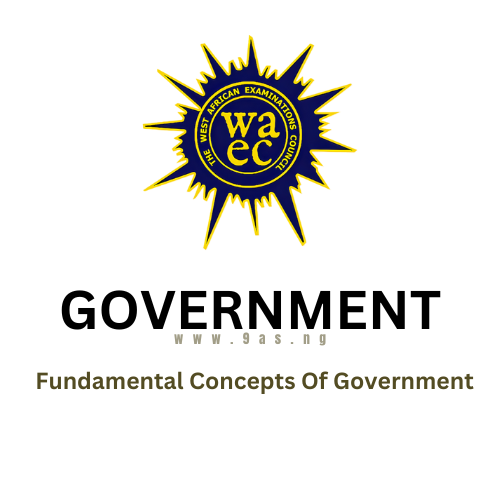THEORY
1. Differentiate between legal sovereignty and political sovereignty.
2. What factors limit the sovereignty of government?
3. What is political authority?
4. Explain the various types of political authority.
5. Explain the political concept of legitimacy.
6. What are the factors that sustain legitimacy in a state?
7. What is sovereignty of a state?
8. Outline the limitation of sovereignty in a state.
9. Explain the concept of the sovereignty of a state.
10. State any five factors that limit the sovereignty of a state.
11. Explain the term Authority.
12. What are thę main sources of political authority?
13. ldentify six external limitations to the exercise of sovereignty of the State.
14. What is legitimacy in government?
15. Outline any five ways of acquiring legitimacy.
16. Define Legitimacy.
17. Highlight any four factors that determine legitimacy.
18. What is a legitimate government?
19. Outline any four features of legitimacy.
OBJECTIVES
1. Political sovereignty in the state resides with the
A. executive. B. people. C. national assembly. D. international community.
2. The right to direct and command people is
A. authority. B. power. C. legality. D. legitimacy.
3. The two components of sovereignty are
A. the rule of law and fundamental human rights. B. political power and political authority. C. political culture and political socialization. D. political independence and supreme authority of the state within its territory.
4. The ability to command obedience is called
A. authority. B. influence. C. legitimacy. D. mobilization.
5. Which of the following is a source of political power?
A. Gerrymandering. B. Election. C. Filibuster. D. Immunity.
6. The concept of sovereignty was popularized by
A. J.J Rousseau. B. A.V. Dicey. C. C.L. Montesquieu. D. Jeart Bodin.
7. Political authority is the
A. consent and recognition of the legitimacy of the government by the governed. B. power of the government to impose its will on the people, C. ability of the people to reject a bad government. D. power of the government derived from the constitution.
8. The psychological support a regime gets from its citizens If they believe the regime is right and ought to be obeyed, is known as
A. sovereignty. B. power. C. authority. D. legitimacy.
9. The two components of sovereignty are
A. influence and political authority. B. political culture and political socialization, C. legal and political independence. D. political and economic developments.
10. Political authority is the
A. legitimate right to exercise political power. B. ability t control political behaviour. C. right to participate in political campaigns. D. right to form political parties.
11. Popular sovereignty belongs to the
A. government. B. military. C. electorate. D. legislature.
12. The extent to which the citizens regard the institutions, officials and activities of government as right and acceptable is known as
A. power. B. legitimacy. C. influence. D. authority.
13. Power is transformed into legal authority through
A. force. B. prayers. C. influence. D. legitimacy.
14.Acceptability of the government in power by the governed is known as
A. legitimacy. B. sovereignty. C. democracy. D. authority.
15.The supreme power of a state to make and enforce laws within its jurisdiction is called
A. enfranchisement. B. sovereignty. C. decolonization. D. independence.
16. Right to rule based on norms, customs and conventions of the people is referred to as
A. legal authority. B. charismatic authority. C. rational authority. D. traditional authority.
17.Which of the following is not a legitimate government?
A. Democratic government. B. Republican government. C. Military government. D. Monarchical government.
18. The scholar who defined sovereignty as an absolute power vested in one authority was
A. A.V. Dicey. B. Jean Bodin. C. John Austin. D. Montesquieu.
19.Political sovereignty belongs to the
A. press. B. people. C. legislature. D. executive.
20. In the process of governing, input refers to the
A. decision and actions of the authorities. B. regulations made by the government for the individuals and groups. C. demands made by individuals and groups for action by the authorities. D. demands which have become official policies.
21. The ability of leaders to make and enforce decisions in a state is called
A. sovereignty. B. political. power. C. socialization. D. legitimacy.
22. Political power could be acquired through
A. persuasion. B. election. C. sanction. D. nomination.
23. LEGITIMACY means the
A. seizure of power by force. B. separation of the organs of government. C. sovereignty of parliament. D. acceptance of the right to rule.
24. A government is said to be legitimate if it
A. has the people’s mandate to rule. B. is not oppressive. people’s criticisms. a political society. B. a country’s chief executive. C. the judges of the Supreme Court. D. traditional rulers.
25. Power can be defined as the
A. ability of the parliament to delegate to another body or person the right to make laws on its behalf. B. right to rule irrespective of oppositions to the ruler. C. capacity to compel or influence others to do what they would otherwise not do. D. capacity to encourage others to do social services for the people.
26. Sovereignty ultimately resides in A. the people within institutions, officials and activities of government is known as A. authority. B. permission. C. legitimacy. D. power.
27. Power can be defined as the ability to
A. compel or influence obedience. B. encourage self-help projects. C. delegate judicial functions. D. oppose government policies.
28. A government which has the ability to compel its citizens to obedience is said to be exercising
A. authority. B. coercion, C. power. D. legitimacy.
29. A government’s supreme power to demand obedience from its citizens demonstrates the notion of
A. rule of law. B. parliamentary supremacy. groups to go on strike. C. capacity of the government to C. sovereignty. D. separation of powers.
30.Power is transformed into authority through
A. force. B. prayers. C. propaganda. D. legitimacy.
31. The power of a state government to make policies, issue orders and spend public funds is an attribute of its A. administrative authority. B. political authority. C. charismatic authority. D. Traditional authority.
32. Political power is concerned with the
A. allocation of resources and enforcement of decisions. B. use of force to ensure compliance. C. process of winning wars by military. D. formation of pressure groups.
33. Power can be described as the
A. ability of the legislature to delegate its right of law making to another body. B. ability of the executive to encourage pressure C. Minority power. D. Power from the electorate.
34. Political sovereignty belongs to
A. the people. B. students. C. soldiers. D. the parliament.
35. Ability to enforce obedience is known as
A. legitimacy. B. power. C. influence. D, fame.
36. A major source of political power is
A. election B. force. C. influence. D. ombudsman.
37. Power is transferred into authority through
A. force., B. legitimacy. C. influence. D, sovereignty.
38. Political authority is the
A, legitimate right to exercise political power. B. ability to control political behaviour. C. right to participate in political campaigns. D. right to form political parties
39. The extent to which the citizens accept the institutions, officials and activities of government is known as A. authority. B. permission. C. legitimacy. D. power
40. The concept of sovereignty was propounded by
A. Adam Smith. B. Jeremy Bentham. C. Karl Marx. D. Jean Bodin.
41. Popular sovereignty belongs to the
A. immigrants. B. electorate. C. cabinet. D. legislature.
42. Which of the following factors places limitation to the application of sovereignty in a state? A. Civil service. B. International laws. C. Political culture. D. Political parties.
43. A government is legitimate if it A. comes to power through a coup d’etat. B. is not oppressive. C. provides social services for the people. D. has the mandate of the people to rule.
44. Authority means
A. an automatic right to be obeyed. B. legitimate right to be obeyed. C. a civic right to obey others. D. a civic right to be obeyed.
45. The concept of sovereignty was first introduced into political terminology in 1576 by
A. Winston Churchill. B. Jean Bodin. C. Karl Marx. D. Abraham Lincoln.
46. Power is different from authority because power lacks
A. ability. B. sovereignty. C. probity. D. legitimacy.
47. Sovereignty implies all the following except
A. The highest authority in a state. B. a state of political independence. C. unlimited powers, of a state to make and enforce laws. D. the supremacy of political parties.
48. Popular Sovereignty is located in the
A. military. B. police. C. electorate. D. opinion leaders.
49. Legitimacy is determined mainly by
A. charisma. B. Influence. C. Acceptance. D. Desire.
50. The right to govern and administer the affairs of the people of a country is
A. power. B. diplomacy. C. authority. D. influence.
51. Who among the following provided the detailed work on sovereignty?
A. Jean Bodin. B. Fredrick Engels. C. Bolaji Akinyemi. D. Thomas Hobbes.
52. The power of the electorate signifies
A. political sovereignty. B. legal sovereignty. C. external Sovereignty. D. internal sovereignty.
53. A major difference between power and authority is that, authority is A. scarcely exercised. B. more dependent on coercion. C. acquired popularly. D. exercised through force.
54. The sum total of authority in a state unrestrained by law is
A. monarchy. B. society. C. Oligarchy. D. Sovereignty.
55. The sovereignty of a state can be limited to a great by
A. Rule of law B. Separation of Powers C. International laws and conventions D. Legislative Assembly.
56. The exercise of power can arise from any of the following sources except
A. legitimate power B. charismatic power C. expert power D. ideological power.
57. Apart from globalization, what other factor to a large extent affects the sovereignty of a state? A. Right of a franchise B. Inalienability C. System of government D. International laws.



